A Brief Historical Sketch of Immanuel Evangelical Lutheran Church
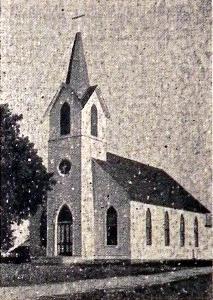
Center Township, Calhoun County, Iowa
For the Sixtieth Anniversary of It's Founding
August 14, 1938
This historical sketch is dedicated to the founders of Immanuel church, whose faith and courage have preserved for us the blessings of the Gospel and the Lutheran Confessions,
and
To the pastors, especially the sainted Rev. Theodore Mattfeld, who have faithfully and unselfishly dedicated their lives and services to ministration of their fellowmen.
60th Jubilee, Aug. 14, 1938
Guest Speakers:
- The Rev. G. Rickels, Atkins, Iowa.
- The Rev. H. W. Berner, Ireton, Iowa.
- The Rev. W. Huebner, Mondovi, Wis.
- The Rev. W F. Georg, Palmer, Alaska.
Committees in Charge:
- Mr. Frank Gleason
- Mr. August Hepp
- Mr. Edward Volk
- Mrs. Fred Tapps
- Mrs. Albert Hammerle
- Mrs. Emil Blaas
- Mrs. Frank Gleason
- Miss Lois Schroeder
- Miss Lorna Schoepke
- Miss Alice Gleason
Praise the Lord!
"I remember the days of the old; I meditate on all Thy works; I muse on the works of Thy hands." Psalm 143, 5.
"The Lord is good; His mercy is everlasting; and His Truth endureth forever!" Psalm 100, 5.
"Bless the Lord, O my soul: and all that is within me, bless His holy name. Bless the Lord, O my soul, and Forget Not All His Benefits!" Psalm 103, 1, 2.
A Long Career
Some one has said: "From nothing comes nothing." This axiom is true and holds good in every way and manner. When we ask: "How did the world come into being?", we must reply, "Not from itself; there must be a Creator." So it is with this congregation. There must have been a cause; otherwise there could be no results.
As we delve into the history of Immanuel congregation, we quite naturally search for the cause. The cause was not that the missionary found the people, but that the people located the missionary. It happened in this manner: There was the need for Christian baptism and the parents, being members of the Lutheran faith, desired the baptism by a Lutheran pastor. The Lord has presented Mr. and Mrs. Theodore Zierke, Sr., with a daughter. After inquiry they heard that such a pastor occasionally preached northeast of Manson. One of the fathers of this congregation had a boyhood friend living northwest of Manson. These two friends arranged for a family visit to which the father and mother of the daughter were invited. On the respective Sunday they drove a lumber wagon to the place northeast of Manson where the services were being held that day. The pastor met the group; the infant was baptized; and arrangements were made to conduct Lutheran services south of Manson. The pastor who answered the petition of this group was the Rev. Theodore Mattfeld, and the infant baptized is now Mrs. August Ausborn of Yetter.
That is the story of the very beginnings of Immanuel church which later on led the organization.
First Settlers
How did this group of people come to locate in Calhoun county? Where did they come from? When did they arrive here? Such natural questions are easily answered. These were the years when the influx into Iowa from the East was greatest and Iowa had become the goal of land-hungry and home-seeking people; the years when endless streams of immigrants poured over the fertile plains; the years when the demand for land was so strong that in one single year four million acres of precious Iowa soil came into the possessions of these new settlers. Among these newcomers were many Lutherans. Some of them settled in Calhoun county and Center township.
Among these land-seekers were Mr. Fred Ramthun, Mr. Fred Berner and Mr. Frank Wendt. In 1874 they left Lindenwood, Illinois, to locate a new home for their families. They arrived in Fort Dodge, then the mecca for land-seekers and land-agents. From Fort Dodge these three men were driven in a horse and buggy by a
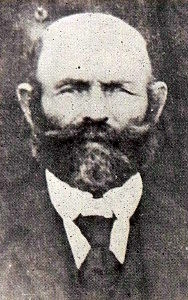
Fred Berner
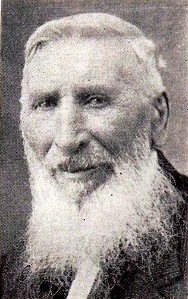
Fred Ramthun
land-agent to this community. The three fathers selected each a piece of land at the price of $5.00 per acre. After their purchase they hurried home to Lindenwood with the good news. With them they took a map of Center township from which map four other fathers at Lindenwood selected a parcel of land. We are astonished at the faith of these men who selected land without sight of it. But they trusted their friends and took their word that the land was good. They knew the first three would not have selected and purchased land in this community unless it were also good enough for themselves. Those were the days when man's and friend's word was as good as gold.
The next year, 1875, these seven fathers with their families arrived in Manson in the middle of March in the midst of a snow-storm. They found shelter in a home, called a hotel, and bedded themselves on straw on the floor. The storm was a genuine blizzard; it lasted for several days. They were compelled to remain in that "hotel" until the storm had ended. These seven families were the nucleus of Immanuel congregation. Their names are herewith made available to the public and may they be entered into the records of the state of Iowa and our church. Their names are: Fred Ramthun, Carl Bahls, Carl Berner, Fred Berner, Joachim Lembke, Sr., Theodore Zierke, Frank Wendt and John Wendt. Mr. Theodore Zierke and his young wife did not constitute a separate family but were a part of the Joachim Lembke family. In all there were 27 souls.
At that time and for some twenty more years this region was rich in three natural resources: frog-pounds, mosquitos and muskrats. There were no straight roads, no fences, no drainage ditches, no bridges over creeks. Trails along the high places in the fields were the best avenues for travel. Manson was the nearest town. All needy purchases were made there.
Friends Meet
Mr. Fred Ramthun has a school-boy friend living northwest of Manson. This friend's name was Carl Steinbrink. These two chums occasionally met in Manson. Mr. Steinbrink then arranged for the visit mentioned at the beginning of this narrative. Mr. Fred Ramthun and family and Mr. and Mrs. Joachim Lembke and Mr. and Mrs. Theodore Zierke and infant daughter went on that memorable journey. That was the first meeting between a group of people and the pioneer pastor who later served these people for many years as their own pastor.
Organization
This meeting occurred early in the fall of 1875. Pastor Mattfeld then visited the colony and arranged for services. For three years services were conducted once in this and then in that home of the pioneers. However, in 1878 an organization was effected under the name of Immanuel Lutheran Congregation, Unaltered Augsburg Confession, in Center township, Calhoun county, Iowa. The following men signed the constitution: Fred Ramthun, Fred Berner, Theodore Zierke, Carl Berner, Joachim Lembke, Sr., Joachim Lembke, Jr., Wm. Pohl, Frank Wendt, Wm. Kretlow, Carl Bahls, Christ Gross and John Wendt. The names of person not previously mentioned
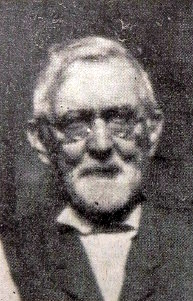
Theodore Zierke
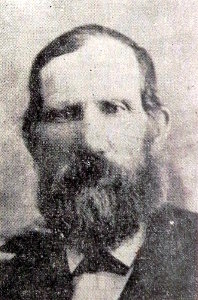
Joachim Lembke
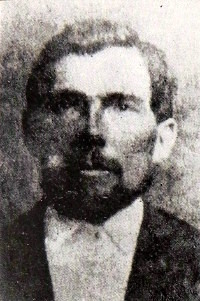
Wm. Pohl
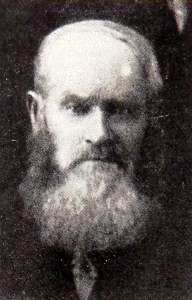
Carl Berner
had moved into this territory since the first fathers arrived. Most of them came from the same country in Illinois. Services were now conducted in the Richards' schoolhouse.
During this time the other group of Lutherans residing northeast of Manson, who were also being served by Pastor Mattfeld, spoke of building a church. Some of them wanted the church placed near the Lizard Creek north of the present Knierim; others desired it placed at the present site of Trinity church. Into this debate the people of the Immanuel group entered and endeavored to convince both other groups to build a church about four miles north of the present Immanuel church and thereby unite all groups into one congregation. But this suggestion was dismissed. The Knierim people built their own church at the present location and our forefathers continued to worship in school houses. It should be mentioned here for the benefit of the younger generation that the name of the town of Knierim was formerly Gatesville.
Hardships in Travel
Pastor Mattfeld was a real pioneer missionary. The zeal of the Lord constrained him to work zealously for the spreading of God's church. For 17 years he served not only the Trinity and Immanuel congregations, but sought other groups in the western part of the state, in addition to the teaching of school daily and preparing the youth for Christian confirmation. Often he would come to the Immanuel group and impart religious instructions in the homes of the church, but most of the older members of Immanuel received their religious instructions at Trinity school. Some would stay with some family within easy reach of the school; a few even boarded with the pastor and helped to occupy space in the small parsonage that was needed for the pastor's own family.
Trying and disgusting must have been traveling in those days. Road conditions were beyond our belief and description. Many interesting events and anecdotes are related of those times. Many times Pastor Mattfeld was pulled out of mudholes, snowbanks and sloughs. Many a time it was necessary for him to change his Sunday suit for that of some larger parishioner before he would stand before the group and preach, because of the mud on his suit, or because it was soaked with water. Many a time his white horse, Pete, simply refused to move either from a pond or puddle or snowdrift, so the missionary unhesitatingly leaped off, walked to fulfill his duties and when he reached home a day or two later, his white horse would greet him at the gate with a cheering neigh. In 1892, after 17 years of strenuous work, Pastor Mattfeld was released to accept the call to the congregation at Crozier, Buena Vista county.
Second Pastor
In June of the same year a call was extended jointly by Trinity and Immanuel congregations to the Rev. Fred Ehlers who accepted the call. Pastor Ehlers was a younger man and did not have to serve so large a territory as did the former pastor. Other pastors had been placed at stations formerly served by Pastor Mattfeld. So Pastor Ehlers could and did devote more time to the
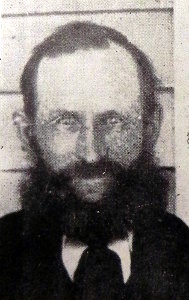
Carl Bahls
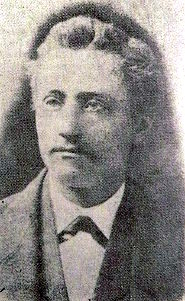
Wm. Kretlow
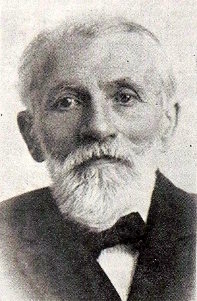
Rev. Theodore Mattfeld
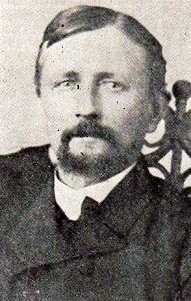
Rev. Fred Ehlers
development of Immanuel congregation. Two years after his induction into office here, in 1894, our present church edifice was erected at the actual cost of $1,557.00. It was dedicated on the 23rd of September. The festival preachers were: Rev. Theodore Mattfeld, from Crozier; Rev. Theo. Schiepsieck from Pomeroy; Rev. Jobst from Dayton, Iowa. The church was located on the present property which had been purchased the year before for $200.00 from Mr. Carl Bahls. Pastor Ehlers, however, had to resign his office because of illness after only seven years of work here. He is at the present time residing in Storm Lake.
Independence
Sixteen years had now passed since the founding of Immanuel. Prior to his departure Pastor Ehlers had the pleasure and distinction to install as his successor at Immanuel the first resident pastor in the person of the ministerial candidate Walter F. Georg on Sept. 3, 1899.
Immanuel received a new impetus in having its own resident pastor. A parsonage was erected in 1899; a chancel and vestry were added to the church and in 1901 the present school house was erected. For two years prior to the erection of the school house, Pastor Georg conducted school in the upstairs of the parsonage. Many of the present generation still tell of the sessions they had and made up there. During the brief period the congregation was permitted to enjoy this young man, many new members were added and Immanuel began to increase and spread in all directions.
After only five years of ministering to this congregation Pastor Georg was called to Webster City, Iowa. Immanuel, however, soon received another pastor in the Rev. G. Rickels of Farnhamville. Pastor Rickels was installed by the pastor of Trinity church, the Rev. H. Schwenk, on the 12th day of March, 1905. During this time the congregation continued to develop outwardly and especially inwardly. Pastor Rickels also faithfully taught the youth four days in the week and also continued to serve a group of people in Rockwell City. These were the years of quiet but steady spiritual and material growth.
After fifteen years of devoted service to this congregation, Pastor Rickels was released to the congregation at Atkins, Iowa, and the Rev. Walter Huebner from Shawano, Wis., was called and installed by the Rev. L. A. Mueller on August 8, 1920. At this time the old bulging type of heater in the church was replaced by a furnace and a small basement dug under the church and the interior of the church was decorated. Pastor Huebner relinquished his office here and followed a call to Mondovi, Wis.
Today
Since November, 1921, the present pastor, Rev. W. C. H. Schaefer, has served this congregation. The pastor established a regular parish school. Most of the years, the pastor taught the school, however, one term was taught by Miss Ada Schaefer, another by student of theology Herbert Berner, another by Miss Lorna Schaefer, and in the last year, Miss Bertha Schoepke was engaged to teach. A new modern parsonage was erected in 1922 and in 1928 the golden jubilee of the congregation was celebrated with the former pastors, G. Rickels and W. F. Georg, serving as guest speakers. At that time the church was again redecorated, a new oak floor laid and a new one-manual Hinner's pipe organ installed. And this year, the year of the sixtieth anniversary of its founding, Immanuel again repainted all the buildings and redecorated the interior of the church.
Since the records of this congregation have been kept separate from those of Trinity congregation, that is from the year 1899, the following official acts have been performed by the resident pastors: Baptism: 510; Confirmations: 290; Marriages: 120; Funerals: 130; Approximately 3,500 sermons were preached.
At the present time Immanuel numbers 263 souls, 180 communicant members and 48 voters. We very much regret that Immanuel's membership has decreased in the last several years. This is due to lack of space and land for our younger people. They are compelled to move away from here. Yet we are happy to report that nearly all of them have affiliated with another congregation of our faith. Thus Immanuel serves as a mother to many other congregations, by rearing faithful members of the church and sending them to them.
Education
Last year our school was attended by only 21 pupils. There were many more who should have attended. Lack of appreciation of the parish school is the main reason for this. We should once ask ourselves: "Can
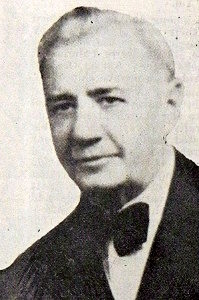
Rev. W. F. Georg
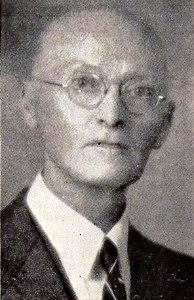
Rev. G. Rickels
we really afford not to have a parish school," instead of saying: "We can't afford to have a parish school."
Our Sunday School has a membership of 49 pupils and is taught by: Miss Bertha Schoepke, Mr. Ewald Scoepke, Mrs. Harry Temple, Mrs. Tobe Rodewald, Mr. Walter Volk, Mr. Edward Volk, Mr. Kenneth Pettit, Mrs. Kenneth Pettis, and the pastor. In the spring of 1938, to be exact, on April 3, our Sunday school was organized. Until now Christenlehre (catechetical instructions by the pastor during the regular Sunday services) had been conducted. But the demand for a Sunday School became so strong and insistent that the congregation decided to grant to the parents of the children and all who were interested in the religious instruction and education the opportunity to express their ideas and opinions on this vital subject at a special meeting and also authorized this special meeting to decide either for or against the establishment of that institution. The membership of this meeting unanimously favored the Sunday School and a period of instruction before the regular Sunday morning services. By this step the congregation has again demonstrated that she is interested in the spiritual training and rearing of her future members. In both the parish and Sunday School our children are nurtured in the doctrines of the Bible and our most holy Lutheran faith. Children thus reared will eventually become well able to continue the work of the Kingdom of God here on earth when we elders are called to our heavenly rest, "He that has the youth has the future."
Societies
Ladies' Aid
A desire had been expressed among and by the women of the congregation to have their own organization by which they hoped to be of some service to the local congregation and church at large. This desire culminated in the organization of Immanuel's Ladies' Aid on Oct. 14, 1920. At present Immanuel's Aid has a membership of 43.
Regular meetings are held monthly in the home of the members as their names are in alphabetical order. The Aid has been of much value to the church at home and abroad. It has donated liberally to various charitable endeavors of the church, assisted needy families in our midst and aided the local church in its social endeavors. At the present time the Aid has set as its goal the erection of either a parish hall, or the completion of the present basement under the church; either of which are a great need at the present time for the various meetings and activities of the various societies within the congregation. The Aid has on savings account the sum of nearly $600.00.
The Walther League
The Walther League is the society for the youth of our church and in it the educational activities of the church are continued. Its purpose is to keep the youth with the church. Its principal activities are; Service, Education, and Recreation. Our society was organized on July 27, 1922, and affiliated with the International Organization shortly thereafter. The League has a definite program and adheres to it strictly. It meets thrice a month. At each meeting some phase of education is considered. The League is especially interested in the sanitarium for tuberculosis at Wheat Ridge, near Denver, Colo. There the International organization owns and operates this haven of rest for the afflicted.
Item of Interest
A history of a congregation is not complete without the mention of certain human activities besides and apart from the actual congregational activities, yet they form and are a very definite asset to the life and development of the congregation. We refer to the special gifts and donations to the congregation by individuals and groups. We mention the gift of the present altar by the sainted Mr. Emil Lenz; the gift of the candelabra on the altar by Mrs. Mary Gleason in memory of her husband and elder Mr. Wilbur Gleason; the lectern and pulpit Bible and the piano in school, a gift of the Walther League; the donation of ten new hymnals by Mrs. Louise Berner; the presentation to the congregation of a complete set of altar coverings by the ladies' aid and the orchestra. Finally, at this time and on this important occasion it should also be mentioned that the elders and other officials of the congregation have always loyally and eagerly collaborated and co-operated with the pastor in the performances of the various tasks imposed upon them by the congregation. It must be borne in mind that the congregation is supreme in the Lutheran church and the officers have only so much power and authority as is specifically granted them by resolution of the whole congregation. No board of society has authority except it be by the will of the congregation.
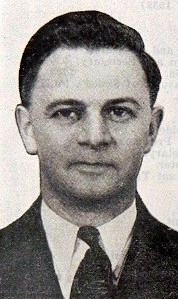
Rev. W. Huebner
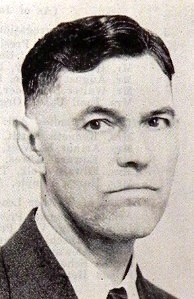
Rev. W. C. H. Schaefer
Synod-Minded
Immanuel congregation has been since 1901 a voting member of the Synod of Missouri, Ohio, and Other States and has regularly sent representatives to the state and national conventions and has liberally contributed toward the needs of the church at large. Immanuel has no incumbrances at this time and no other financial obligation than the current ones. It has always met its budget assignments for the synod at large. Our interests are not confined to the local church and territory, but it extends also to the welfare of the church and her work in distant parts of the world.
Immanuel church is especially interested in the work of the Iowa Home Finding Society, located at Fort Dodge, Iowa. This institution receives, cares for, and places orphan children in the homes of our church members. The congregation has for years set a certain day in the fall of the year for the bringing of products of our fields, gardens, orchards and pantries which are donated to the "Home." This day is our harvest festival.
Thus Immanuel tends not only to the spiritual, but also to the physical wellbeing of mankind. Its children receive the milk of God's Word in our two schools, the adults the stronger food in the regular services and Bible class, the missions our financial support and the orphans a portion of our material blessins.
Our prayer for the future is that the future generations of the congregation may abide by the faith of the fathers and follow in their footsteps then we are sure that Immanuel will be what her name signifies: God be with us.
Soli Deo Gloria! All Praise be to God.
Roster of Officers
(As of July 1, 1938)
1. Officers of Congregation:
- Mr. Emil Bahls, President.
- Mr. Otto Kretlow, Deacon and Treasure.
- Mr. Hershel Lighty, Deacon and Secretary.
- Mr. August Gleason, Deacon.
- Mr. Walter Schroeder, Treasure of Synod's Funds.
- Mrs. Emil Bahls, Organist.
2. Officers of Ladies' Aid:
- Mrs. Kenneth Pettit, President.
- Mrs. Arthur E. Wolf, Vice President.
- Mrs. Edward Alwes, Secretary.
- Mrs. Edward Volk, Treasurer.
- Mrs. Harry Temple, Assistant Treasurer.
3. Officers of Walther League:
- Arnold Schoepke, President.
- Julius Sittig, Vice President.
- Herbert Dischler, Secretary.
- Tobe Rodewald, Treasurer.
- Bertha Schoepke, Secretary of Education.
- Frieda Hepp, Secretary of Service.
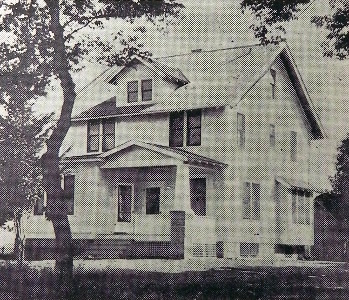
The Present Parsonage


